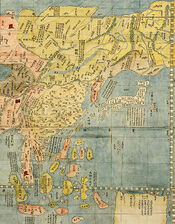Template:Are You Sure/May 10: Difference between revisions
Jump to navigation
Jump to search

(Created page with "• ... that Jesuit priest, mathematician, and astronomer '''Matteo Ricci''' became the first European to enter the Forbidden City of Beijing in...") |
No edit summary |
||
| Line 1: | Line 1: | ||
[[File:Map_of_the_Far_East_by_Matteo_Ricci_(1602).jpg|thumb|175px|link=Matteo Ricci (nonfiction)|A Chinese language map of the Far East by the Italian Jesuit [[Matteo Ricci (nonfiction)|Matteo Ricci]], made in 1602.]] | |||
• ... that Jesuit priest, mathematician, and astronomer '''[[Matteo Ricci (nonfiction)|Matteo Ricci]]''' became the first European to enter the Forbidden City of Beijing in 1601 when he was invited to become an adviser to the imperial court of the Wanli Emperor; and that this honor was in recognition of Ricci's scientific abilities, chiefly his predictions of solar eclipses, which were significant events in the Chinese world; and that Ricci was given free access to the Forbidden City but never met the reclusive Wanli Emperor, who, however, granted him patronage, with a generous stipend and supported Ricci's completion of the Zhifang Waiji, China's first global atlas? | • ... that Jesuit priest, mathematician, and astronomer '''[[Matteo Ricci (nonfiction)|Matteo Ricci]]''' became the first European to enter the Forbidden City of Beijing in 1601 when he was invited to become an adviser to the imperial court of the Wanli Emperor; and that this honor was in recognition of Ricci's scientific abilities, chiefly his predictions of solar eclipses, which were significant events in the Chinese world; and that Ricci was given free access to the Forbidden City but never met the reclusive Wanli Emperor, who, however, granted him patronage, with a generous stipend and supported Ricci's completion of the Zhifang Waiji, China's first global atlas? | ||
Revision as of 13:49, 9 May 2020

A Chinese language map of the Far East by the Italian Jesuit Matteo Ricci, made in 1602.
• ... that Jesuit priest, mathematician, and astronomer Matteo Ricci became the first European to enter the Forbidden City of Beijing in 1601 when he was invited to become an adviser to the imperial court of the Wanli Emperor; and that this honor was in recognition of Ricci's scientific abilities, chiefly his predictions of solar eclipses, which were significant events in the Chinese world; and that Ricci was given free access to the Forbidden City but never met the reclusive Wanli Emperor, who, however, granted him patronage, with a generous stipend and supported Ricci's completion of the Zhifang Waiji, China's first global atlas?